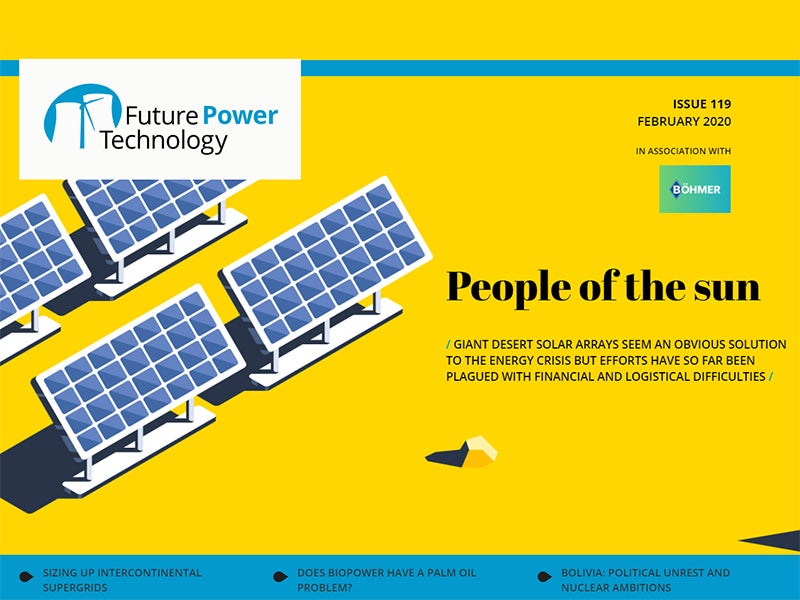
Future Power Technology is now available on all devices. Read the new issue here.
The mass construction of solar panels across the world’s deserts has long been touted as a solution to the energy crisis, but the solution has rarely proven practical. So what needs to be done to make it viable?
Also, we look at China and South Korea’s plans to build an ocean-floor power network to connect their electricity grids and create a pan-Asian electric power system, ask if biofuel has a palm oil problem, and consider the impact of political uncertainty in Bolivia on the country’s nuclear sector.
Finally, we learn if mountains could play a role in long-term energy storage, speak to Lumos about a project to electrify one million households in Nigeria, find out how utility billing be better managed, and hear about Sellafield’s VR nuclear waste removal crane.
In this issue
Giant solar arrays: do big ambitions mean big problems
Some of the world’s most ambitious large-scale solar projects have been plagued by delays, ultimately making them a financial burden rather than a beacon on the renewable power horizon. Andrew Tunnicliffe asks, does this mean such projects are outdated?
Super-size me: inside the Asian electricity super grid project
China and South Korea plan to build an ocean-floor power network to connect their electricity grids and create a pan-Asian electric power system. Julian Turner gets the lowdown on the project from Rajendra Iyer, head of grid integration solutions within the Grid Solutions business unit at GE Renewable Energy.
Does biofuel have a palm oil problem?
Biofuel is gaining prominence in the power industry. Yet its eco-credentials largely depend on what fuel is used in its production, and when the French Government banned palm oil from the country’s biofuel scheme, it was hailed as a positive step in the fight against wide-scale deforestation. Scarlett Evans asks, what exactly are the dangers of palm oil, and what does this case tell us about how biopower should be regulated?
Bolivian unrest: what now for the country’s nuclear ambitions?
Backed by Russia, Bolivia had set its sights on building new nuclear energy capacity to supply the country’s growing demand for electricity – but could recent political instability put these plans into doubt? Heidi Vella investigates the progress and potential of Bolivia’s atomic energy ambitions.
Peak performance: could mountains create long-term energy storage?
As the world looks for reliable and cost-effective means of housing energy for long periods of time, a new study is proposing using mountains and gravity as giant storage systems. Ross Davies learns more about the findings.
Electrifying Nigeria: could solar power one million households?
Nigeria has launched a $75m fund to provide electricity to its citizens, with solar panel manufacturer Lumos planning to use the money to electrify one million households over the next five years. JP Casey considers the impacts of this ambitious proposal.
Energy theft: switched-on solutions to the UK power sector’s £440m problem
Energy theft is a serious issue and Ofgem figures reveal that 86% of energy companies are missing the UK regulator’s residential targets, despite being required to detect, investigate and prevent the crime. Julian Turner talks mitigation strategies with Grosvenor Services Group MD Lloyd Birkhead.
Using mixed reality to tackle nuclear waste: Sellafield’s new VR crane
Energy company Sellafield has collaborated with the University of Liverpool’s Virtual Engineering Centre to develop a mixed-reality simulator, which mimics the working environment of a nuclear plant waste removal crane. Yoana Cholteeva speaks with Virtual Engineering Centre senior marketing manager Sarah Martin-Tyrell about the technology.
Preview – Future Power Technology March
Concentrated solar power (CSP) has many advantages over more established PV technologies, but the scale and complexity has driven a growing gap in costs between CSP and other renewable technologies. Is there still a place for CSP in the solar energy mix?
Also, we look at Aberdeen’s ambitions to transition into a clean energy leader, examine the rise and fall of attitudes to onshore wind, and report back from COP25.
Finally, we profile Japan’s renewable sector, hear from EcoHZ about electric vehicles’ success in Norway, find out about the world’s first digital twin of a hydroelectric power station, and speak to Statera about expanding the role of back-up energy in the UK.



